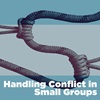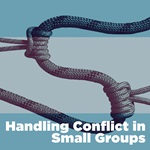"What unites us is far greater than what divides us."
It was John F. Kennedy who first spoke these oft-repeated words in an address to the Canadian Parliament.
Nowhere is this truer than in the church. It's the blood of Jesus Christ—a force greater than any other on this planet—that unites us. Little should be able to divide in the face of that unifying power.
I was blessed to serve on staff at National Community Church for several years where lead pastor Mark Batterson placed a strong emphasis on the unity of the church. We prioritized unity over ecclesiology or theological debates. Our staff consisted of Baptists and Pentecostals, Arminians and Calvinists, men and women, black and white, liberals and conservatives, Republicans and Democrats.
That last one, Republicans and Democrats, is of particular note for a church in the heart of Washington, DC.
As a church, NCC remains decisively and intentionally apolitical. They believe nothing, including political affiliation and ideology, should stand in the way of an encounter with the gospel. And for a church whose attenders and community are heavily involved on Capitol Hill, politics is exactly the sort of thing that could derail an opportunity to meet Jesus.
Many NCCers are employed in some form or fashion in the political realm. Young men and women come from across the country and around the world to shape policy and influence the world for the better. Many work as staff members for senators and congresspersons on Capitol Hill.
Of course, they often have radically different perspectives on how to achieve that better world.
The political rancor that you see on TV, the stuff that the candidates say and the pundits shout, takes an interesting turn in the capital city. On the one hand many DC residents eat, sleep, and breathe politics. They're often responsible for the speeches that those politicians and pundits give. And when you work in that world, your office is usually full of people who agree with you, creating an echo chamber that reinforces whatever belief you hold.
On the other hand, the people on the other side are your colleagues and neighbors. They're your baristas at Starbucks (politics is often less lucrative than you'd think), the other parents in the PTA, and the members of your small group. In cases such as mine, they're your spouse.
And so you live in the tension between the human tendency to demonize those who disagree with your deep seated beliefs and the knowledge that those earnest people who live next door are from the other party.
A Risky New Group
A few years ago Mike Whitford, campus pastor at NCC and former Capitol Hill staffer, started a small group for people who work in politics. He called it For Such a Time, a phrase found in Esther 4:14 explaining that Esther was placed into a position of political influence "for such a time as this."
What made this group different than most of the myriad of gatherings of politicos in DC is that it was built around the good news of Jesus rather than a political party or position, so it wasn't limited to people from one side of the aisle.
Mike eventually passed that group off to Juliana Heerschap and Aaron Welty, two NCCers who were working on Capitol Hill. The group has been very successful. It grew in numbers, multiplied, and even launched a group specifically for summer interns.
But as is often the case with small groups, their success can't fully be measured by statistics. It's the stories that have emerged from the group that speak to the unifying power of the gospel.
Like all good small groups, For Such a Time isn't a weekly meeting. It's a community. And so group members share testimonies, help one another move, spend Saturdays in nature together, even share Thanksgiving dinner. But one extracurricular activity is a bit riskier.
During the 2012 election cycle, the members of For Such a Time decided that they were going to watch the Presidential debates together. Remember, this isn't a casual gathering of friends who disagree. These are sharp, well-informed, passionate young professionals, some of whom have dedicated their careers to a particular political party.
If any small-group outing had the potential to go bad, it was this one. This is the church equivalent of crazy Uncle Al bringing his new wife to Christmas dinner when beloved Aunt Annie is going to be there.
But all of the things that could go have gone wrong didn't. Aaron said that two hours after one of the debates ended they were still together "because two individuals in the small group were totally going at it one-on-one on justice versus mercy and grace." I'm not sure they solved the tension between justice and mercy, but what about tension between the two of them? According to Aaron, "The two people that were having that debate are still friends today, and they tease one another about it."
More recently, after the tragic, racially-motivated murder of nine black parishioners by a white gunman at Emanuel African Methodist Episcopal Church in Charleston, they had a discussion on race and white privilege. Juliana called it "an amazing dialogue about evil, sin, grace, and areas of our life where we've been blind. For me, it was unifying to know regardless of our political beliefs, this was something we as the church could talk about in a respectful and humble manner."
Is True Unity Possible?
When I asked Juliana and Aaron the key to unity in a group with such diverse political perspectives, Aaron pointed to seeing each other as redeemed bearers of God's image:
Just putting a lot of the divisive politics, policy, and ideology aside and focusing on people. Looking past politics, policy, and the pursuit of power to actually see individual people. Intentionally separating who they are both as a living, breathing, expression of God's creative capacity and a redeemed son or daughter, from what they do, which is counterintuitive in a city that banks so much on, holds so highly, and roots identity in what someone does and/or what title they hold.
And Juliana alluded to the words Jesus spoke while in the upper room with his disciples (John 14-17):
The key to unity amidst a lot of Capitol Hill staffers who work for politically diverse members of Congress has been close personal relationships within the group and understanding what it means to be one in Christ. If there is one thing I want to prioritize, it's bringing people together. Most often that looks like creating the space for that to happen in my own home. It means having Democrats and Republicans over for dinner and watching a Presidential debate together.
Also, as a leader, maintaining unity means I'm responsible for being honest with group members. Politics is tough and I don't have it figured out. There aren't always black and white answers—sometimes there is just grace. As staffers, sometimes the policy recommendations we give are shot down, become law, or get messy when it's my boss versus their boss in media headlines.
Unity is hard in the church. It is often even harder when you have political opinions thrown into the mix. It can get awkward. But we want to be known not by the title on our business card, political affiliation, or who we work for, but by our love for one another.
That'll preach.
—Will Johnston is the former Small Group Catalyst for National Community Church in Washington, D.C.










